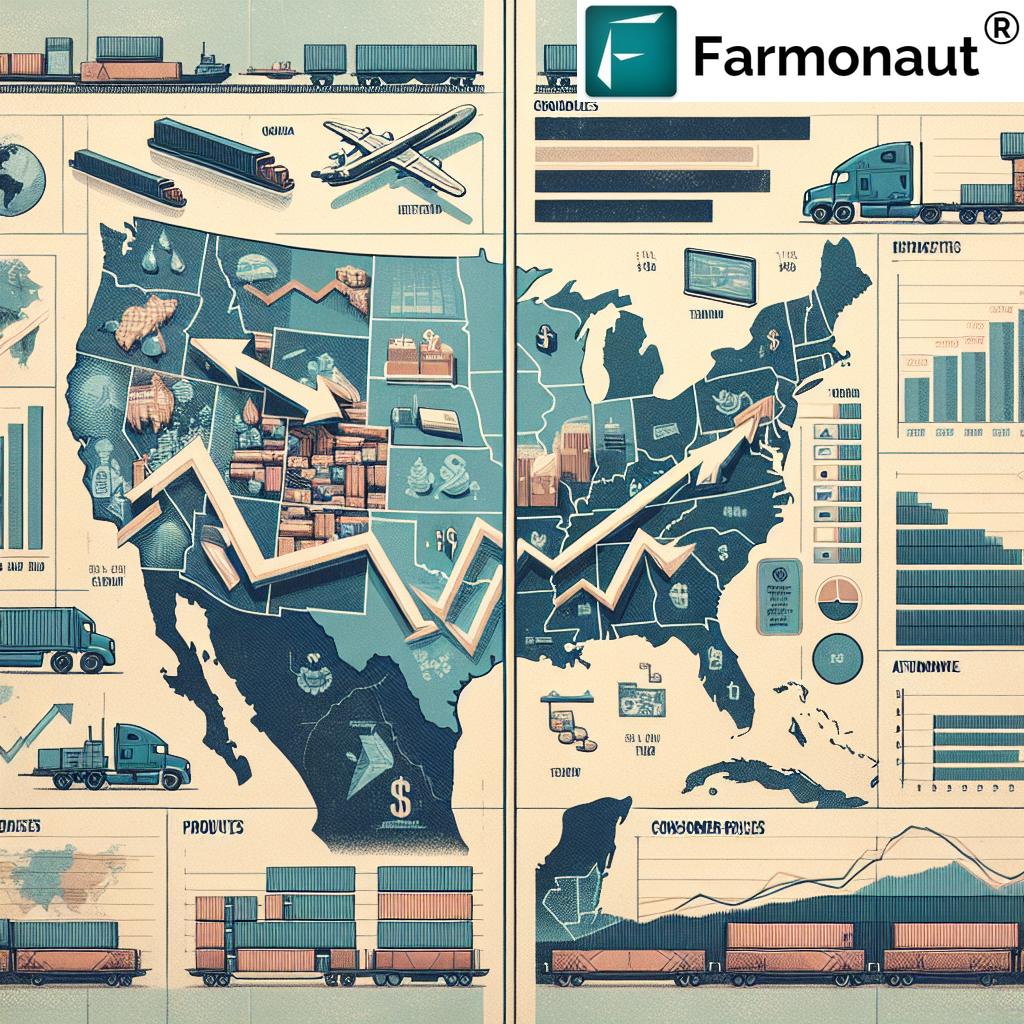Farmonaut’s Guide: Navigating the Economic Impact of US Trade Tariffs on Canada, Mexico, and China
“US tariffs on Canada, Mexico, and China affect over 33% of total US trade, impacting multiple sectors.”
In the ever-evolving landscape of global trade, recent developments have sent shockwaves through international markets. On February 1, President Donald Trump’s executive orders imposing significant tariffs on the United States’ three largest trading partners – Canada, Mexico, and China – have set the stage for potential economic turmoil. As we at Farmonaut closely monitor these developments, we recognize the profound implications these trade policies may have on various sectors, including agriculture, which is at the heart of our mission.
In this comprehensive guide, we’ll delve into the intricate web of economic impacts stemming from these new US trade tariffs. Our analysis will cover the far-reaching consequences on consumer prices, local industries, and international relations. As a company dedicated to empowering farmers with cutting-edge technology, we understand the importance of staying informed about global economic trends that can affect agricultural markets.

Understanding the New Tariff Landscape
The newly imposed tariffs, set to take effect on February 4, are poised to disrupt over one-third of U.S. trade. Here’s a breakdown of the tariffs:
- A 25% tariff on all goods imported from Canada and Mexico
- A 10% tariff on Canadian energy products
- A 10% tariff on goods from China
These measures threaten to impact millions of American jobs and could potentially spark a trade war reminiscent of the tariffs implemented during Trump’s first term. The justification for these tariffs stems from claims regarding illegal immigration and drug imports, a narrative that has been consistent since the early days of the Trump administration.
Sectoral Impact Analysis
Economists from S&P Global anticipate substantial disruptions across various sectors:
- Mexico: Auto and electric equipment sectors
- Canada: Mineral processing sector
- United States: Agriculture, fishing, metals, and automotive sectors
For farmers and agribusinesses using Farmonaut’s satellite-based farm management solutions, understanding these impacts is crucial for making informed decisions about crop management and resource allocation.
Consumer Price Implications
The ripple effects of these tariffs are expected to reach American consumers in various ways:
- Grocery Stores: Expect price increases, especially on products commonly imported from Mexico such as avocados, cucumbers, and tomatoes.
- Automotive Sales: Vehicle prices may rise, although the impact might be delayed due to existing inventories.
- Fuel Prices: The 10% tariff on Canadian energy products could lead to increased prices at the pump, particularly in the Midwest.
Dr. Felix Tintelnot from Duke University notes that if tariffs remain in place, price increases are inevitable over time. This underscores the importance of efficient resource management in agriculture, which is where Farmonaut’s AI-driven advisory systems can provide valuable insights.
Economic Growth and Inflation Concerns
Economists at Goldman Sachs warn that the full implementation of these tariffs could:
- Escalate inflationary pressures
- Dampen economic growth
- Cause a spike in prices across several consumer goods
For the agricultural sector, this economic climate emphasizes the need for precision farming techniques to optimize yields and reduce costs. Farmonaut’s real-time crop health monitoring can be a crucial tool in navigating these challenges.

International Reactions and Potential Retaliation
The international community has not remained silent in the face of these new tariffs:
- Canada: Officials are considering targeting specific U.S. exports, such as Florida’s orange juice and Kentucky’s peanut butter.
- Mexico: President Claudia Sheinbaum has expressed readiness to implement counter-tariffs.
- Prime Minister Justin Trudeau: Addressed the potential for a “forceful and immediate response” to protect Canada’s interests.
These potential retaliatory measures could further complicate the global trade landscape, affecting supply chains and potentially impacting agricultural exports.
“Economists warn new US tariffs could impact millions of American jobs through inflation and slower economic growth.”
Supply Chain Adjustments
Prior to the tariff announcement, there were no significant changes in shipping activities from Canada, Mexico, or China. However, there was an uptick in freight volumes as companies scrambled to move goods before the tariffs took effect. Unlike the overwhelming floods of imports faced in prior years that caused supply chain disruptions, recent trends indicate a more measured adjustment in logistics across North America.
For agricultural businesses, this highlights the importance of efficient supply chain management. Farmonaut’s blockchain-based traceability solutions can provide valuable transparency in these uncertain times.
Comparative Economic Impact
| Economic Indicator | Canada | Mexico | China |
|---|---|---|---|
| Affected Trade Volume ($ Billion) | 300 | 250 | 500 |
| Potential Job Losses | 50,000 | 40,000 | 100,000 |
| Expected Price Increases (%) | 5-10% | 7-12% | 8-15% |
| Possible Retaliatory Measures | Targeted tariffs on specific U.S. exports | Counter-tariffs on U.S. goods | Restrictions on U.S. business operations in China |
The Role of Technology in Navigating Economic Challenges
In these uncertain economic times, leveraging technology becomes crucial for businesses, especially in the agricultural sector. Farmonaut’s suite of tools can help farmers and agribusinesses navigate these challenges:
- Satellite-Based Crop Health Monitoring: Optimize resource usage and crop yields to offset potential price increases.
- Jeevn AI Advisory System: Make informed decisions based on real-time data and expert insights.
- Blockchain-Based Product Traceability: Ensure transparency in supply chains, crucial in a volatile trade environment.
- Fleet and Resource Management: Improve operational efficiency to mitigate the impact of rising costs.
To learn more about how Farmonaut can help you navigate these economic challenges, check out our 
Strategies for Businesses and Consumers
As the economic landscape shifts due to these new tariffs, businesses and consumers alike must adapt. Here are some strategies to consider:
For Businesses:
- Diversify Supply Chains: Reduce reliance on single-country sourcing to mitigate tariff impacts.
- Invest in Efficiency: Utilize technologies like Farmonaut’s AI-driven systems to optimize operations and reduce costs.
- Explore New Markets: Look for opportunities in countries not affected by the tariffs.
- Price Strategically: Consider carefully how much of the tariff costs to pass on to consumers.
For Consumers:
- Budget Wisely: Anticipate potential price increases in various sectors, especially groceries and fuel.
- Consider Alternatives: Look for locally produced goods that may not be affected by the tariffs.
- Stay Informed: Keep track of economic news and how it might affect personal finances.
For agricultural businesses and farmers, leveraging Farmonaut’s API can provide crucial data to make informed decisions in this changing economic landscape.
Long-Term Economic Outlook
While the immediate effects of the tariffs are concerning, it’s important to consider the long-term economic outlook:
- Global Supply Chain Restructuring: Companies may seek to diversify their supply chains, potentially benefiting other countries not affected by the tariffs.
- Innovation Push: Higher costs may drive companies to invest in innovation and automation to remain competitive.
- Trade Agreement Renegotiations: The tariffs could lead to new trade negotiations, potentially resulting in updated agreements that address current economic realities.
In this evolving economic landscape, staying ahead with cutting-edge agricultural technology is more important than ever. Explore Farmonaut’s solutions for iOS:  and Android:
and Android: 
The Role of Technology in Agricultural Resilience
In these challenging economic times, the agricultural sector must leverage technology to enhance resilience and efficiency. Farmonaut’s suite of tools offers several advantages:
- Precision Agriculture: Our satellite-based crop health monitoring allows farmers to optimize resource use, potentially offsetting increased input costs due to tariffs.
- AI-Driven Insights: The Jeevn AI Advisory System provides personalized recommendations, helping farmers make informed decisions in a volatile market.
- Supply Chain Transparency: Our blockchain-based traceability solutions can help agribusinesses navigate complex international trade regulations and maintain consumer trust.
- Resource Optimization: With potential price increases looming, our fleet and resource management tools can help businesses reduce operational costs.
By embracing these technologies, the agricultural sector can better weather the economic storm brought on by these new tariffs.
Farmonaut: Your Partner in Agricultural Innovation
As we navigate these uncertain economic waters, Farmonaut remains committed to providing cutting-edge solutions for the agricultural sector. Our mission to make precision agriculture affordable and accessible is more relevant than ever in the face of potential economic challenges.
Explore our comprehensive range of services:
- Real-time crop health monitoring
- AI-based advisory systems
- Blockchain-based traceability
- Resource management tools
For more information on how Farmonaut can help your agricultural business thrive in these challenging times, visit our API Developer Docs.
Earn With Farmonaut
Earn 20% recurring commission with Farmonaut’s affiliate program by sharing your promo code and helping farmers save 10%. Onboard 10 Elite farmers monthly to earn a minimum of $148,000 annually—start now and grow your income!
Learn more about our Affiliate Program
Farmonaut Subscriptions
Conclusion
The imposition of new US trade tariffs on Canada, Mexico, and China marks a significant shift in the global economic landscape. As we’ve explored in this guide, the potential impacts are far-reaching, affecting consumer prices, job markets, and international relations. For the agricultural sector, these changes underscore the importance of embracing innovative technologies to enhance efficiency and resilience.
At Farmonaut, we remain committed to providing farmers and agribusinesses with the tools they need to navigate these challenging times. By leveraging our satellite-based farm management solutions, AI-driven insights, and blockchain technology, the agricultural sector can better position itself to weather economic uncertainties and thrive in the face of change.
As we move forward, staying informed, adaptable, and technologically empowered will be key to success in this new economic reality. Remember, Farmonaut is here to support you every step of the way.
FAQ Section
- How will the new US tariffs affect consumer prices?
The tariffs are expected to lead to price increases across various sectors, particularly in groceries, automotive sales, and fuel prices. - What sectors are most likely to be impacted by these tariffs?
The auto and electric equipment sectors in Mexico, the mineral processing sector in Canada, and the agriculture, fishing, metals, and automotive sectors in the US are expected to be significantly affected. - How might Canada and Mexico respond to these tariffs?
Both countries have indicated they might implement retaliatory measures, such as targeted tariffs on specific US exports. - What role can technology play in helping businesses navigate these economic challenges?
Technologies like Farmonaut’s satellite-based farm management solutions can help businesses optimize operations, reduce costs, and make informed decisions based on real-time data. - How might these tariffs affect global supply chains?
The tariffs could lead to a restructuring of global supply chains, with companies potentially seeking to diversify their sourcing to mitigate the impact of tariffs.
Stay tuned to Farmonaut for more updates and insights on how these economic changes may affect the agricultural sector. Together, we can navigate these challenges and emerge stronger.













